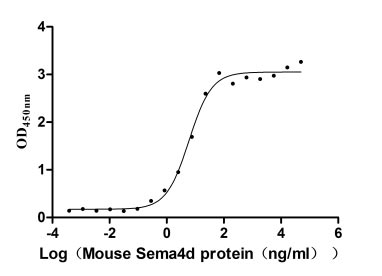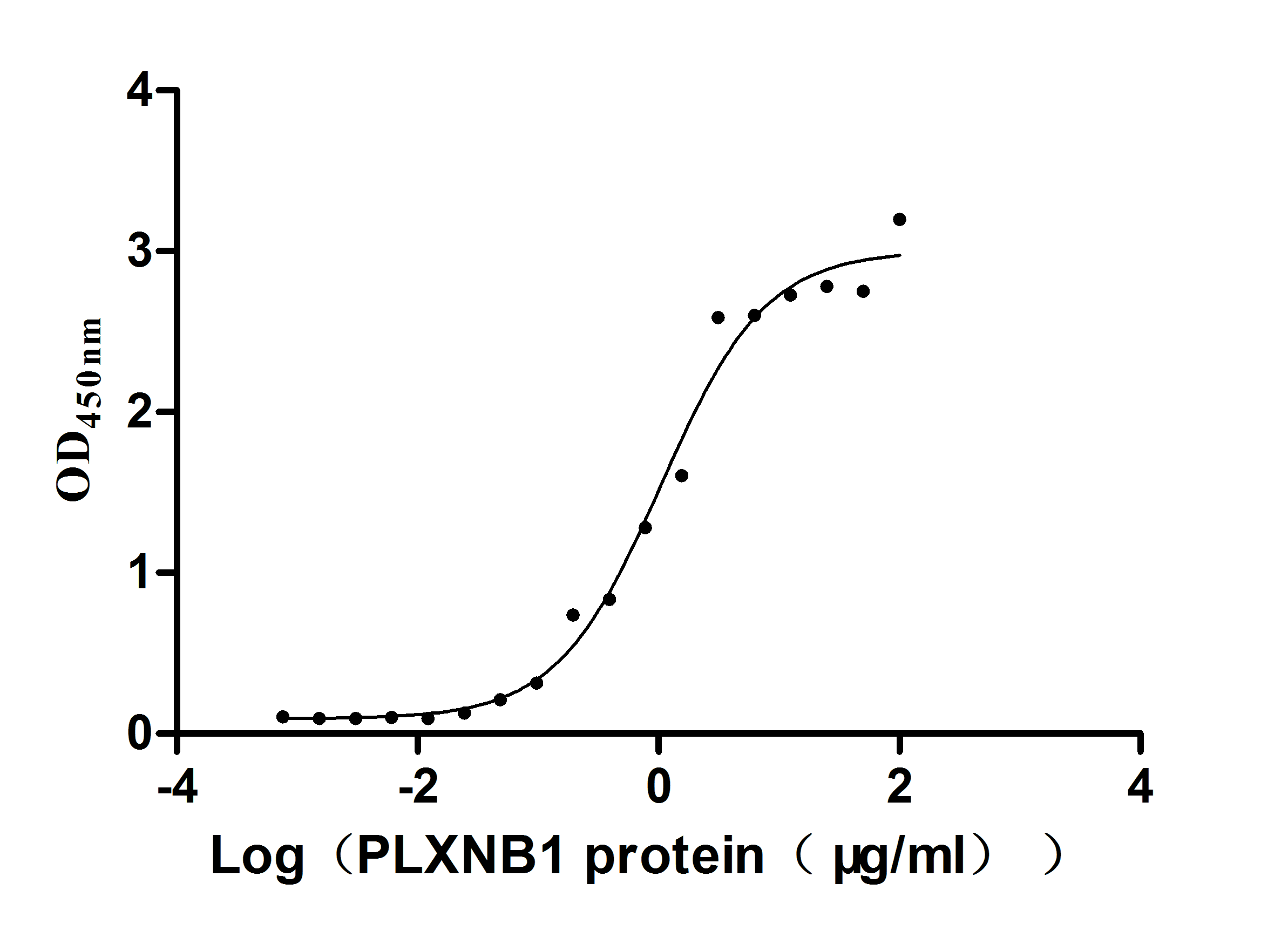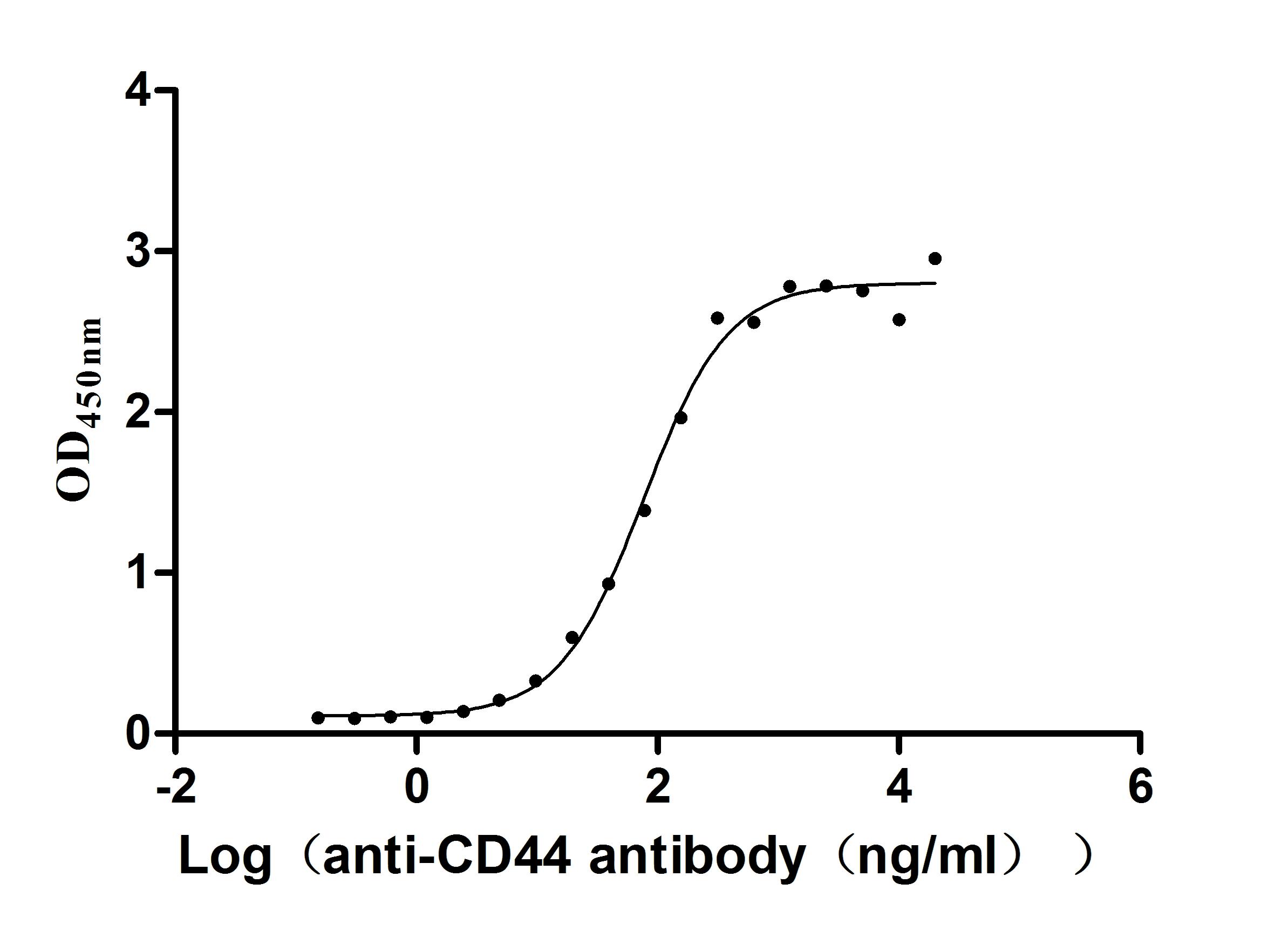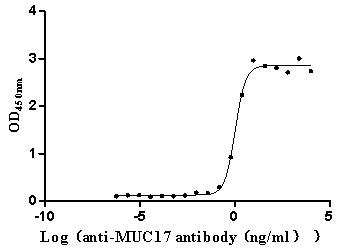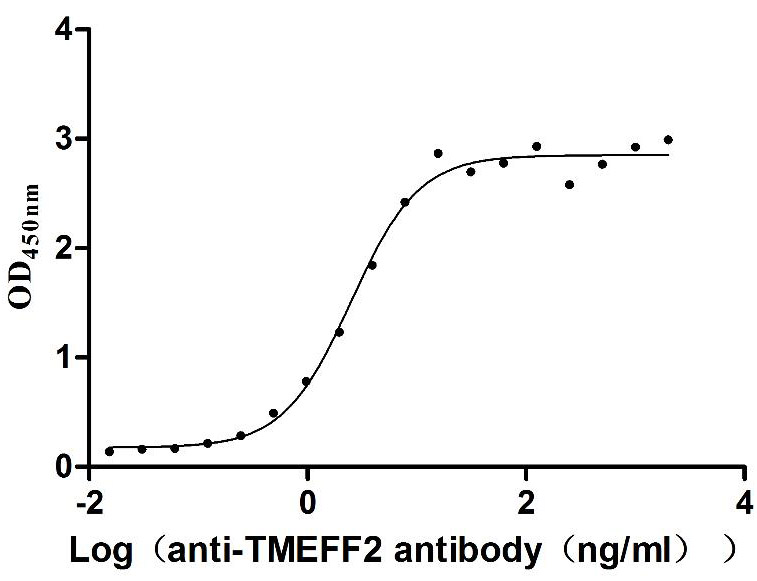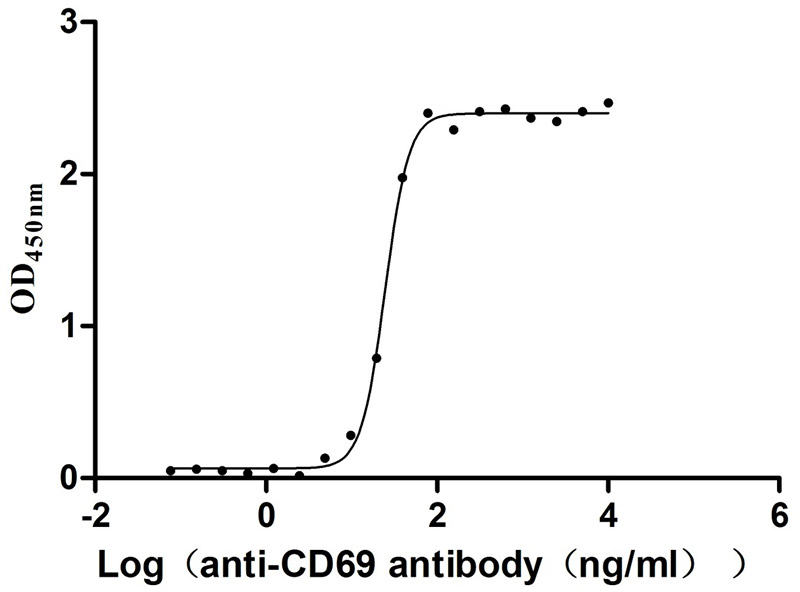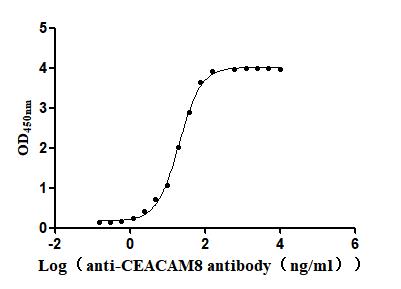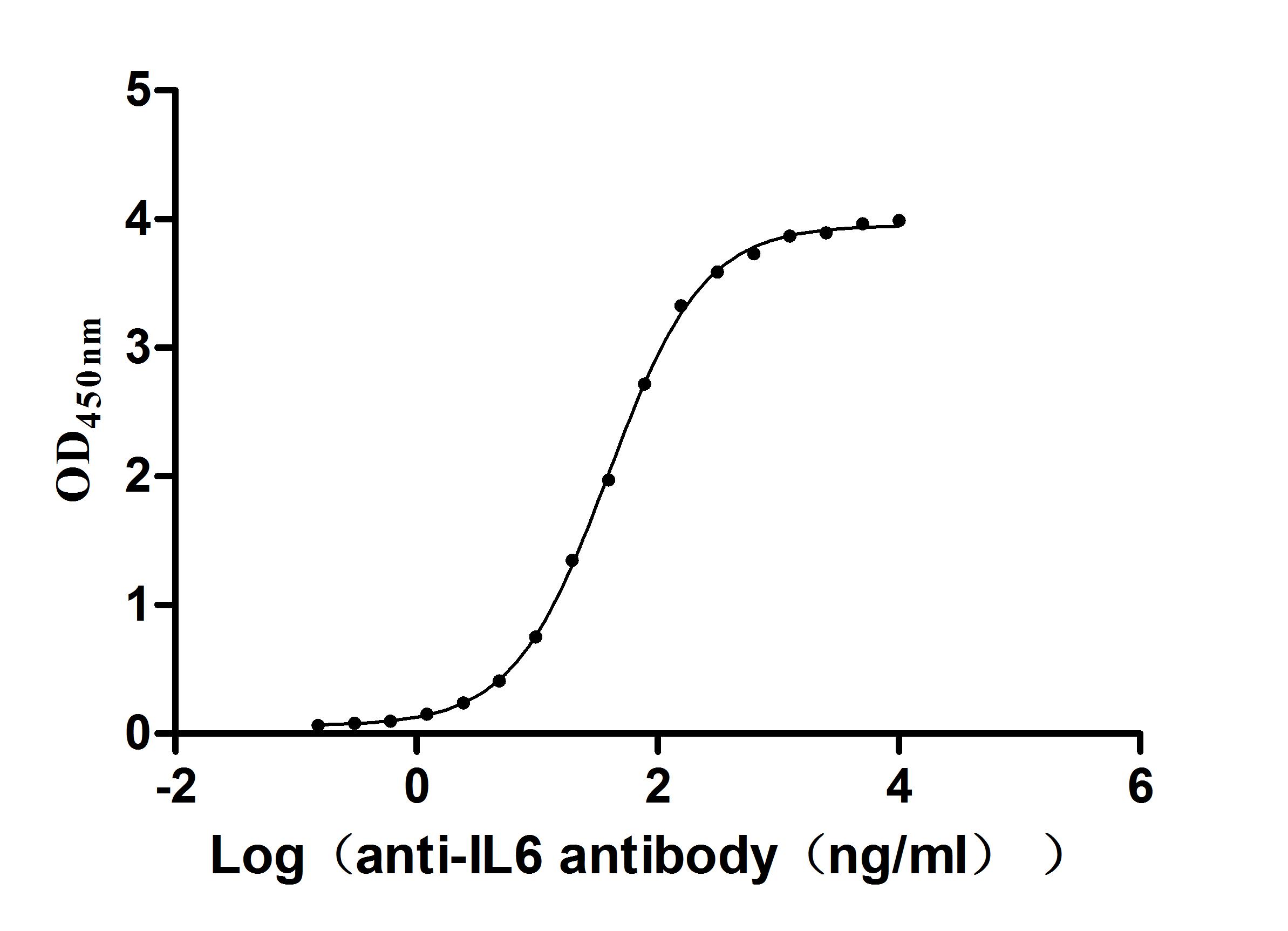Recombinant Human Neutral amino acid transporter B (0) (SLC1A5), partial
-
货号:CSB-YP620892HU
-
规格:
-
来源:Yeast
-
其他:
-
货号:CSB-EP620892HU
-
规格:
-
来源:E.coli
-
其他:
-
货号:CSB-EP620892HU-B
-
规格:
-
来源:E.coli
-
共轭:Avi-tag Biotinylated
E. coli biotin ligase (BirA) is highly specific in covalently attaching biotin to the 15 amino acid AviTag peptide. This recombinant protein was biotinylated in vivo by AviTag-BirA technology, which method is BriA catalyzes amide linkage between the biotin and the specific lysine of the AviTag.
-
其他:
-
货号:CSB-BP620892HU
-
规格:
-
来源:Baculovirus
-
其他:
-
货号:CSB-MP620892HU
-
规格:
-
来源:Mammalian cell
-
其他:
产品详情
-
纯度:>85% (SDS-PAGE)
-
基因名:SLC1A5
-
Uniprot No.:
-
别名:ASCT2; AAAT; AAAT_HUMAN; ATB(0); ATBO; Baboon M7 virus receptor; FLJ31068; M7V1; M7VS1; Neutral amino acid transporter B(0); R16; RD114/simian type D retrovirus receptor; RDR; RDRC; SLC1A5; Sodium dependent neutral amino acid transporter type 2; Sodium-dependent neutral amino acid transporter type 2; Solute carrier family 1 (neutral amino acid transporter); member 5; Solute carrier family 1 member 5
-
种属:Homo sapiens (Human)
-
蛋白长度:Partial
-
蛋白标签:Tag type will be determined during the manufacturing process.
The tag type will be determined during production process. If you have specified tag type, please tell us and we will develop the specified tag preferentially. -
产品提供形式:Lyophilized powder
Note: We will preferentially ship the format that we have in stock, however, if you have any special requirement for the format, please remark your requirement when placing the order, we will prepare according to your demand. -
复溶:We recommend that this vial be briefly centrifuged prior to opening to bring the contents to the bottom. Please reconstitute protein in deionized sterile water to a concentration of 0.1-1.0 mg/mL.We recommend to add 5-50% of glycerol (final concentration) and aliquot for long-term storage at -20℃/-80℃. Our default final concentration of glycerol is 50%. Customers could use it as reference.
-
储存条件:Store at -20°C/-80°C upon receipt, aliquoting is necessary for mutiple use. Avoid repeated freeze-thaw cycles.
-
保质期:The shelf life is related to many factors, storage state, buffer ingredients, storage temperature and the stability of the protein itself.
Generally, the shelf life of liquid form is 6 months at -20°C/-80°C. The shelf life of lyophilized form is 12 months at -20°C/-80°C. -
货期:Delivery time may differ from different purchasing way or location, please kindly consult your local distributors for specific delivery time.Note: All of our proteins are default shipped with normal blue ice packs, if you request to ship with dry ice, please communicate with us in advance and extra fees will be charged.
-
注意事项:Repeated freezing and thawing is not recommended. Store working aliquots at 4°C for up to one week.
-
Datasheet :Please contact us to get it.
相关产品
靶点详情
-
功能:Sodium-dependent amino acids transporter that has a broad substrate specificity, with a preference for zwitterionic amino acids. It accepts as substrates all neutral amino acids, including glutamine, asparagine, and branched-chain and aromatic amino acids, and excludes methylated, anionic, and cationic amino acids. Through binding of the fusogenic protein syncytin-1/ERVW-1 may mediate trophoblasts syncytialization, the spontaneous fusion of their plasma membranes, an essential process in placental development.; (Microbial infection) Acts as a cell surface receptor for Feline endogenous virus RD114.; (Microbial infection) Acts as a cell surface receptor for Baboon M7 endogenous virus.; (Microbial infection) Acts as a cell surface receptor for type D simian retroviruses.
-
基因功能参考文献:
- Data suggest that amino acid uptake via ASCT2/SLC1A5 is required for cell proliferation/tumor growth independently of LAT1/SLC7A5; in part, these studies were conducted in lung and colon adenocarcinoma cell lines and involved gene knockout techniques. (ASCT2/SLC1A5 = solute carrier family-1 member-5; LAT1/SLC7A5 = solute carrier family-7 member-5) PMID: 29326164
- This study provides the metabolic molecule SLC1A5 as a potential therapeutic target to increase the efficacy of cetuximab on colorectal cancer PMID: 29363109
- Results demonstrated that ASCT2 and pmTOR protein levels were significantly higher in epithelial ovarian cancer (EOC) tissues and predicting a poor prognosis. The expression levels of ASCT2 and pmTOR in EOC were positively correlated indicating a synergistic effect on the growth and development of early EOC. PMID: 30272366
- intronic variants of the ASCT2 gene have roles in hampering the splicing process and in longevity PMID: 28885889
- These data collectively establish that in an in vitro context, human epithelial and mesenchymal hepatocellular carcinoma cell lines adapt to ASCT2 or LAT1 knockout. PMID: 30029480
- SLC1A5 expression is increased in tumor samples from esophageal cancer patients, and downregulation of SLC1A5 inhibited cell cycle progression and esophageal cancer growth. PMID: 30071532
- Our results indicate that overexpression of SLC1a5 is associated with shorter overall survival in non-small cell lung cancer PMID: 29455869
- the experimental data allowed identifying C467 residue as crucial for substrate binding and for transport activity modulation of hASCT2. PMID: 29495336
- ASCT2 was significantly overexpressed in the gastric cancer (GC) samples compared with adjacent non-cancerous gastric mucosa, in contrast, a significantly higher level of glutamine synthetase (GS) expression was observed in normal tissues than in GC samples compared with adjacent non-cancerous gastric mucosa. PMID: 29435734
- These results indicated that ASCT2 (SLC1A5) could be a novel therapeutic target against KRAS-mutant colorectal cancer. PMID: 28749408
- AR signaling promoted glutamine metabolism by increasing the expression of the glutamine transporters SLC1A4 and SLC1A5, genes commonly overexpressed in prostate cancer. Correspondingly, gene expression signatures of AR activity correlated with SLC1A4 and SLC1A5 mRNA levels in clinical cohorts. PMID: 28507054
- Results provide evidence that ASCT2 enhances glutamine uptake in glycolipid-enriched microdomain/rafts in GD2(+) small-cell lung cancer cells, leading to the enhancement of cell proliferation and migration. PMID: 29151270
- High ASCT2 expression is associated with head and neck squamous cell carcinoma. PMID: 28823958
- this study shows that IL-2-induced expression of SLC1A5 is a prerequisite for NKG2D-mediated activation of NK cells PMID: 28784848
- Data suggest that both heterogeneous nuclear ribonucleoprotein type M (HNRPM) and solute carrier 1A5 (SLC1A5) have role in the pathogenesis of ovarian cancer. PMID: 28609484
- Both stable and inducible shRNA-mediated ASCT2 knockdown confirmed that inhibiting ASCT2 function was sufficient to prevent cellular proliferation and induce rapid cell death in TN basal-like breast cancer cells, but not in luminal cells. PMID: 26455325
- ASCT2 is an EGFR-associated protein that can be co-targeted by cetuximab, leading to sensitization of cetuximab-treated cells to ROS-induced apoptosis. PMID: 27450723
- The tumor metabolism status determined by expression of GLUT1 and ASCT2. PMID: 28036362
- Data show that SERT associates with ASCT2 (alanine-serine-cysteine-threonine 2), a member of the solute carrier 1 family co-expressed with SERT in serotonergic neurons and involved in the transport of small neutral amino acids across the plasma membrane. PMID: 27143784
- In the absence of SLC1A5 there is a crucial role of SNAT1 in supplying glutamine for glutaminolysis with SNAT2 acting as a "backup" for glutamine transport. PMID: 27129276
- High expression of LAT1 and ASCT2 correlates with metastasis and invasion in esophageal squamous cell carcinoma. PMID: 26936531
- LAT1, 4F2hc and ASCT2 were highly expressed in patients with advanced laryngeal cancer. PMID: 26024742
- Cys is a potent competitive inhibitor of hASCT2 but is not a substrate PMID: 26492990
- Genetic Variants in ASCT2 Gene are Associated with response to therapy in Hepatocelluar Carcinoma PMID: 25987094
- ASCT2 expression plays an important role in tumour cell growth, and is a promising pathological marker for predicting a worse outcome in pancreatic cancer. PMID: 24845232
- The results demonstrate that N-glycosylation of SLC1A5 is critical for trafficking. PMID: 25862406
- ASCT2-mediated glutamine uptake is essential for multiple pathways regulating the cell cycle and cell growth. PMID: 25693838
- ASCT-2 is expressed in human oocytes.ASCT-2 is localized at the acrosomal region and equatorial segment of the spermatozoa. PMID: 24687878
- Report the differential expression of SLC1A5 in human colorectal cancer and normal tissues, and a functional link between SLC1A5 expression and growth and survival of colorectal cancer. PMID: 25337245
- analysis of the kinetic mechanism of the transport catalyzed by the human glutamine/neutral amino acid transporter hASCT2 PMID: 25052780
- ASCT2 expression, which correlates with that of N-Myc and ATF4, is markedly elevated in high-stage neuroblastoma PMID: 25142020
- the expression of LAT1 and ASCT2 is significantly increased in human melanoma. The importance of ASCT2 expression in melanoma was confirmed by shRNA knockdown, which inhibited glutamine uptake, mTORC1 signaling and cell proliferation. PMID: 24531984
- ASC amino-acid transporter 2 expression has a crucial role in the metastasis of pulmonary AC, and is a potential molecular marker for predicting poor prognosis after surgery. PMID: 24603303
- HER2- type breast cancer had the highest expression of stromal GLS1, tumoral GDH, stromal GDH, and tumoral ASCT, while TNBC had the lowest tumoral GDH expression. PMID: 23507704
- stromal expression of the glutamine-metabolism-related proteins GLS1, GDH, ASCT2 increases with worsening histological phyllodes tumor grade. PMID: 23636801
- SLC1A5 plays a key role in Gln transport controlling lung cancer cells' metabolism, growth, and survival. PMID: 23213057
- These data suggest that intracellular replication of Francisella tularensis depends on the function of host cell SLC1A5. PMID: 22804921
- Cx43-mediated GJIC and SLC1A5 interaction play important functional roles in trophoblast cell fusion. PMID: 22238282
- level of amino acid transporter B(0)(ACST2) mRNA expression was lower in forskolin treated BeWo cells PMID: 12175968
- in the six unrelated Hartnup pedigrees studied, examination of linkage at 19q13.3, polymorphisms in the coding sequence and quantitation of expression of SLC1A5 did not suffice to explain the defect in neutral amino acid transport PMID: 12555937
- Hypoxia alters expression and function of syncytin and its receptor (amino acid transport system B(0)) during trophoblast cell fusion of human placental BeWo cells: implications for impaired trophoblast syncytialisation in pre-eclampsia. PMID: 12757936
- ASCT2 messenger RNA was not altered significantly in hypoxia in cytotrophoblasts or in perfused placental cotyledons. PMID: 14520239
- up-regulation of ASCT2 by S-nitroso-N-acetyl-DL-penicillamine might be partially associated with an increase in the density of transporter protein via de novo synthesis PMID: 15848195
- analysis of SLC1A5 mutations on 19q13 in cystinuria patients PMID: 16435221
- evaluation of the interaction of the HERV-W envelope with the hASCT2 receptor; a region consisting of the N-terminal 124 amino acids of the mature glycoprotein surface subunit was determined as the minimal receptor-binding domain PMID: 16820059
- ASCT2 silencing inhibits mTORC1 (mTOR/raptor) signaling and leads to growth repression, followed by enhanced survival signaling via mTORC2 (mTOR/rictor comples) and apoptosis of hepatoma cells. PMID: 17329400
- Localisation and distribution of RDR/ASCT2 in human placental villi suggests that the fusion of placental trophoblast cells is not regulated by local or temporal variations of RDR/ASCT2 expression in villous cytotrophoblast cells. PMID: 17676482
- In human entrocytes, glutamine transport and ASCT2 surface expression induced by short-term EGF are MAPK, PI3K, and Rho-dependent. PMID: 18157695
- SLC1A5 gene is associated with schizophrenia. PMID: 18638388
- In primary term human trophoblasts, ASCT2 mRNA levels were preserved at normoxia and downregulated at 1% O(2) after 48 h. PMID: 19321927
显示更多
收起更多
-
亚细胞定位:Cell membrane; Multi-pass membrane protein. Melanosome. Note=Identified by mass spectrometry in melanosome fractions from stage I to stage IV.
-
蛋白家族:Dicarboxylate/amino acid:cation symporter (DAACS) (TC 2.A.23) family, SLC1A5 subfamily
-
组织特异性:Placenta, lung, skeletal muscle, kidney, pancreas, and intestine.
-
数据库链接:
HGNC: 10943
OMIM: 109190
KEGG: hsa:6510
STRING: 9606.ENSP00000444408
UniGene: Hs.631582
Most popular with customers
-
Recombinant Mouse Semaphorin-4D (Sema4d), partial (Active)
Express system: Mammalian cell
Species: Mus musculus (Mouse)
-
Recombinant Human Plexin-B1 (PLXNB1), partial (Active)
Express system: Mammalian cell
Species: Homo sapiens (Human)
-
Recombinant Macaca fascicularis CD44 antigen (CD44), partial (Active)
Express system: Mammalian cell
Species: Macaca fascicularis (Crab-eating macaque) (Cynomolgus monkey)
-
Recombinant Human Mucin-17 (MUC17), partial (Active)
Express system: Mammalian cell
Species: Homo sapiens (Human)
-
Recombinant Human Tomoregulin-2 (TMEFF2), partial (Active)
Express system: Mammalian cell
Species: Homo sapiens (Human)
-
Recombinant Human Early activation antigen CD69 (CD69), partial (Active)
Express system: Mammalian cell
Species: Homo sapiens (Human)
-
Recombinant Human Carcinoembryonic antigen-related cell adhesion molecule 8(CEACAM8) (Active)
Express system: Mammalian cell
Species: Homo sapiens (Human)
-


